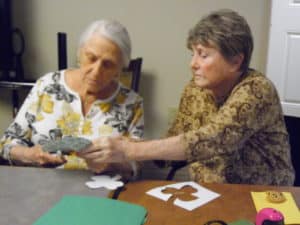Sometimes, you may feel that you don’t know how to care for the person with Alzheimer's disease. You’re not alone. Each day may bring different challenges. Learning about Alzheimer's disease can help you understand and cope with these challenges. Below, we discuss the stages of Alzheimer's disease and tell you how to learn more about the illness.
Stages of Alzheimer's Disease and What they Mean
 Alzheimer’s disease consists of three main stages: mild (sometimes
Alzheimer’s disease consists of three main stages: mild (sometimes
called early-stage), moderate, and severe (sometimes called latestage).
Understanding these stages can help you plan ahead.
Mild Alzheimer’s disease.
In mild Alzheimer’s disease, the first stage, people often have some memory loss and small changes in their personality. They may forget recent events or the names of familiar people or things. Sometimes they may no longer be able to solve simple math problems. People with mild Alzheimer’s disease also slowly lose the ability to plan and organize. For example, they may have trouble making a grocery list and finding items in the store.
Moderate Alzheimer’s disease.
This is the middle stage of Alzheimer’s disease. Memory loss and confusion become more obvious. People have more trouble organizing, planning, and following instructions. They may need help getting dressed and may start having problems with incontinence. This means they can’t control their bladder and/or bowels. People with moderate-stage Alzheimer’s disease may have trouble recognizing family members and friends. Sometimes they may not know where they are or what day or year it is. They also may lack judgment and begin to wander, so people with moderate Alzheimer’s disease should not be left alone. Late in the day they may become restless and begin repeating movements. Also, they may have trouble sleeping. Personality changes can become more serious. People with moderate Alzheimer’s disease may make threats, accuse others of stealing, curse, kick, hit, bite, scream, or grab things.
Severe Alzheimer’s disease.
This is the last stage of Alzheimer’s and ends in the death of the person. Severe Alzheimer’s disease is sometimes called latestage Alzheimer’s disease. In this stage, people often need help with all their daily needs. Without help they may not be able to walk or sit up. Often they may not be able to talk and often cannot recognize family members. They may have trouble swallowing and refuse to eat.
